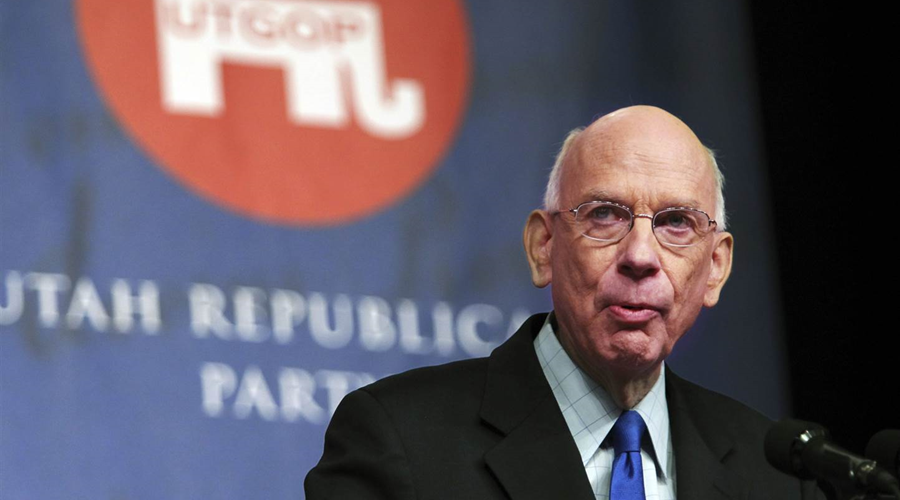
I’ve been criticized for having mostly Democrats as Poster Children. Yes, there are more of them, they’ve been in office longer and they are generally more corrupt. We’ve highlighted two Republicans, Sens. Specter and Grassley. Specter then changed parties. Looking for a Repub to put on a poster we read that the non-partisan Club for Growth PAC will oppose three term U.S. Sen. Robert Bennett (R-Utah) in his reelection bid this year, it made me look at his record. Yep, he qualifies.
“Bennett’s record, whether on spending, earmarks, or his disastrous plan for a federal health care takeover, is part of the problem in Washington,” Chris Chocola, president of the Club, said. “Utah deserves a pro-growth, free-market reformer in the Senate who will instead become a part of the solution…”
Among Bennett’s recent Senate lowlights that the Club sees:
• He voted for TARP, the $750 billion Wall Street bailout;
• He voted to save the disgraceful “Bridge to Nowhere” earmark;
• He refused to block funding for any further bailouts of auto manufacturers;
• He voted against redirecting wasteful Defense earmarks toward improved health care for disabled veterans;
• Voted against a resolution stating the Senate had a “moral obligation” to cut spending;
• After voting against President Obama’s 2010 budget, Bennett voted for most of the bloated spending bills comprising it;
• Bennett’s health care proposal would impose an unconstitutional individual mandate, increase federal taxes and spending by hundreds of billions of and force Americans to pay their insurance premiums through the IRS.
Studies show that spending is correlated with tenure, and Bennett is an example of this phenomenon. He may have entered Congress for public service, and his early voting expressed that commitment, but then the “lowlights” kicked in. Sen. Bennett’s voting has, over time, drifted to bigger, extra-constitutional federal government by which we judge Congress. During the 106th Congress (1999), Bennett served Majority Leader Bill Frist as the Republican Party Whip. Now, he’s on the party leadership team and advises the Minority Leader Mitch McConnell on legislative strategy and policy priorities. Surely, in a seniority system without term limits, those who are most out of touch are those most firmly in control.
Bennett has a B.S. in Political Science. Unlike our other poster boys, he did have private business experience that informed his early periods in elected office even though some of it was politics-connected. He was president of a Washington D.C. public-relations company that occasionally provided cover for CIA operations. During Bennett’s tenure, the PR firm did work for President Nixon’s reelection campaign. He was a Mormon Chaplain in the Utah National Guard from 1957 to 1969, when he entered public service as congressional liaison of the U. S. Department of Transportation. In 1974, Bennett became the public relations director for Summa Corporation, until 1978 when he became the president of Osmond Communications. In 1979, he went into the computer business, first as the chairman of the American Computers Corporation, and then as the president of the Microsonics Corporation from 1981 to 1984. In 1984, Bennett was named CEO of Franklin Quest. He ran for the Senate seat vacated by Jake Garn in 1992.
Bennett has often seemed to be on both sides of issues. He has been a strong opponent of abortion; however, he has shown some support for embryonic stem cell research funded by the taxpayers. He opposed the Act which would provide benefits to the domestic partners of gay and lesbian federal employees. He had generally rejected affirmative action proposals involving quotas although he has voted in favor of expanding funding to women and minority-owned businesses. His recent positions as noted in the above list of “lowlights,” are in contrast to his past support of the Flat Tax and for repeal of the inheritance tax, the alternative minimum tax and the marriage penalty.
He was a free trade advocate, voting in favor of CAFTA presidential fast-tracking for normalizing trade relations, and removing common goods from national security export controls, He opposed President Bush’s efforts to privatize Social Security. His sponsorship of the Healthy Americans Act, championed by Democratic Senator Ron Wyden, seemed at odds with his previous stands opposing public health care.
He has, in his long tenure, sponsored or opposed many other issues and bills than we list here –we just mention enough to give an idea of what he has done, good or bad, depending on your view.
Sen. Bennett is being challenged by several other Republicans and two Democrats in his bid for re-election in 2010. He has been there long enough –18 years is too long and another six is way too long. Sen. Jim DeMint has proposed a term limit constitutional amendment that would limit the Senate to 12 years. It deserves support –if you agree, go to www.termlimits.org and sign the petition.

